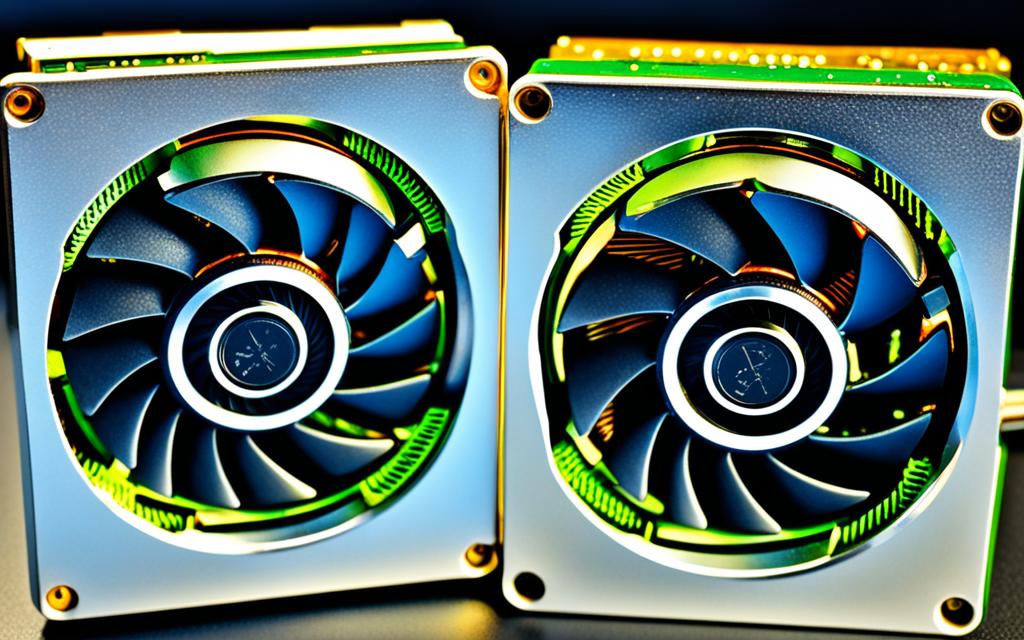Table of Contents
Knowing when to upgrade your GPU or CPU is key for better gaming and computing. These PC components play a big part in how well your system works, especially for gaming. It’s important to look at how much you use them, their performance, and what you might need in the future when thinking about a CPU vs GPU upgrade. Usually, updating the GPU can make a bigger difference for gaming.
But, remember the CPU’s role in keeping your system balanced and running well. You can find out more about upgrading by checking out this useful guide1.
Key Takeaways
- Evaluate your gaming needs to decide if you should upgrade GPU or upgrade CPU.
- Monitor CPU and GPU use to spot any slowdowns.
- Upgrading your GPU is usually the quickest way to boost gaming.
- Think about how long your components last; CPUs can outlive GPUs if looked after.
- Always check your current hardware before deciding to upgrade.
- Getting the best system performance means understanding what the CPU and GPU do.
- Use extra tools to check how well your system is working.
Understanding the Importance of CPU and GPU
In the world of PC gaming, knowing how the CPU and GPU work is key. The CPU, or the computer’s brain, handles tasks and processes data. This is vital for gaming and other work. CPUs can have from two to 28 cores. Quad-core processors are a favorite among gamers and experts2. Take the Intel i7-8700K as an example. It has 6 cores and 12 threads. This setup boosts performance in many applications and reduces lag2.
What is the Role of the CPU?
The CPU’s job in gaming is crucial for doing many things at once and for a smooth gaming experience. A strong CPU helps games run better, especially since modern games need more power. With games becoming more complex, a good CPU is more important. It should handle gameplay and other tasks well. This balance is key for the best performance3.
The Function of the GPU in Gaming
The GPU is very important for making game images and for creating a great gaming experience. It is good at doing lots of calculations quickly. This is great for today’s detailed games. Strong GPUs provide smoother gameplay and can handle high resolutions like 1440p or 4K well3. GPUs have many more cores than CPUs. This lets them handle many tasks at once4.
With gaming tech getting better, a strong GPU is more and more important. It’s needed for things like virtual reality, which need a lot of power to work well3. If you want your gaming setup to last, investing in a great GPU is a good idea. It’ll let you play new games, make high-quality content3, and stream games easily4. The best gaming systems need both a good CPU and GPU to perform their best.
Identifying the Signs of Bottlenecks
Knowing how to spot and fix bottlenecks can make your gaming smoother. Both CPU and GPU issues affect your game’s speed and can cause delays. It’s vital to keep an eye on your system’s performance so you can see what needs improvement.
How to Monitor CPU and GPU Utilisation
Watching CPU and GPU usage during play helps you understand your system better. Tools like Task Manager show how these parts are working. If your graphics card struggles to match the CPU’s speed, that’s a GPU bottleneck. A GPU usage over 95% means trouble, while lower rates might point to CPU issues5.
Common Symptoms of CPU Bottlenecks
It’s important to notice when your CPU is holding you back. Look out for dips in frame rates, game freezing, and slow loading6. These problems can ruin your gaming, so you might need to upgrade or tweak your computer’s setup. Fixing CPU issues helps get rid of game lag and boosts overall speed.
Indicators of GPU Limitations
If your game lags, check your GPU’s performance too. Signs of trouble include high GPU use but poor frame quality. Changing your graphics settings can sometimes fix this fast. But if things are really bad, you may need a new hardware. Using tools to monitor your system helps catch these problems for a better gaming time.
Should I Upgrade My GPU or CPU?
Wondering which to upgrade first, your GPU or CPU? Think about what you want from your games. Do you prefer smoother gameplay or better visuals? For lower graphics settings, focus on the CPU. High-res gaming, however, might need a better GPU. Every game needs different tech to run well.
Assessing Your Gaming Needs
Upgrading your GPU can really boost how your games look and perform. For instance, a new RTX 3060 could get you up to 90 FPS in Shadow of the Tomb Raider. This shows how crucial GPUs are for top-notch gaming today. However, a new CPU like the Ryzen 5600X might not make as big a difference.
Games like Fortnite benefit a lot from a GPU upgrade. A better GPU can mean a big leap in quality and performance7. Figuring out which upgrade will help you reach your gaming goals is key.
Evaluating Current Hardware Specifications
Looking at your current gear is crucial too. Most tasks are fine with a four-core CPU. Yet, tougher games might need more cores. If your GPU has under 8GB of RAM, you could see slower frame rates in new games1. A good GPU also needs the latest drivers to perform its best.
Driver updates help keep your GPU running smoothly for about five to eight years8. Always weigh up your hardware’s current ability against the possible benefits of an upgrade.
When to Upgrade Your GPU First
Knowing when to upgrade your GPU is key to a better gaming experience. If your graphics card is old and doesn’t get updates, it’s time to think about a new one. GPUs usually work well for about 5-8 years. After that, you might see some issues. It’s crucial to keep track of when to upgrade. This ensures your gaming setup stays top-notch. Check out GPU upgrade timings to keep your system in the game.
Recognising Outdated Graphics Cards
Old graphics cards can’t keep up with new games. This causes bad performance and stuttering. For example, moving from a GTX 1660 to an RTX 3060 can boost your game’s FPS from 90 to 116 in Shadow of the Tomb Raider. Timely upgrades can make a big difference7. Also, games now use VRAM to load detailed textures and keep the game smooth. So, choosing a GPU with enough VRAM is important to meet gaming demands8.
Understanding the Impact of VRAM and Drivers
VRAM is crucial for handling detailed graphics. Up-to-date drivers also improve a GPU’s performance. Manufacturers often update drivers to enhance graphics. If your GPU lacks the latest drivers, its performance could suffer8. It’s best to get a new GPU when your current one can’t keep up with new games.
In summary, the performance of gaming PCs depends on knowing when to upgrade graphics cards. It also relies on understanding VRAM and the importance of driver updates. Being informed helps you make timely upgrades for your GPU78.
Conclusion
Choosing whether to upgrade your GPU or CPU is a key step to better PC performance. Know your system’s strengths and limits to help make your choice. For example, if your GPU’s usage is below 85% during gaming, look at upgrading your CPU first. This is especially true for CPU-heavy games like Valorant or Fortnite, which need higher frame rates9.
On the other hand, if your GPU can’t keep up with 60FPS in demanding games like Cyberpunk, think about getting a new graphic card. A new GPU will give you a better, more immersive experience9.
When thinking about your gaming likes, it’s crucial to match your hardware with the needs of new games. Getting stronger components, like the suggested Ryzen 7800X3D or RTX 4080, keeps you ahead in gaming tech. Upgrading your GPU or CPU not only boosts frame rates but also improves rendering. This allows for efficient multitasking, important for gamers and professionals10.
In short, looking at how your system is currently used, understanding your gaming preferences, and making smart upgrades can greatly improve your gaming. While tech advances, so should your components. This ensures your gaming setup stays strong and competitive in the world of video games. The right upgrade choice can make a big difference, making your gaming experience enjoyable and smooth.
FAQ
What should I consider before deciding to upgrade my GPU or CPU?
Before upgrading, assess your system’s current performance. Think about your gaming needs. Also, look at upcoming hardware trends and benchmarks.
How can I determine which component is bottlenecking my performance?
To spot bottlenecks, watch your CPU and GPU usage. Use the Task Manager while playing games. It shows if the CPU or GPU is lagging.
What are the signs that my CPU may need an upgrade?
Signs you need a CPU upgrade include big lag, struggle with running multiple apps, and poor multitasking.
How can I tell if it’s time to upgrade my GPU?
Upgrade your GPU if it’s old and lacks updates. Is it below par in new games, even on low settings? Then it’s time.
What impact do framerates versus visual quality have on my upgrade decision?
Choosing between framerates and visual quality matters. Want smoother gameplay? A better CPU might be key. For stunning visuals, a top GPU is best.
What’s the importance of VRAM when considering a GPU upgrade?
VRAM is key for managing game textures and high resolutions. Not enough VRAM means struggles with latest games, hinting at an upgrade need.
Are there tools available to track my system’s performance?
Yes, tools like MSI Afterburner and GPU-Z track CPU and GPU performance. They offer deep insights into your system’s state and performance.
How can I evaluate my current hardware specifications?
Check your hardware specs with system tools or Windows settings. Compare them to game requirements you’re interested in.
Source Links
- https://forums.tomshardware.com/threads/upgrade-gpu-or-cpu.3821611/ – Question – Upgrade GPU or CPU
- https://www.hp.com/us-en/shop/tech-takes/gpu-vs-cpu-for-pc-gaming – GPU vs CPU: What Matters Most for PC Gaming | HP® Tech Takes
- https://www.cherryservers.com/blog/gpu-vs-cpu-for-gaming – GPU vs CPU for Gaming | Cherry Servers
- https://www.lenovo.com/us/en/glossary/gpu-vs-cpu-for-pc-gaming/ – GPU vs CPU | How do GPUs and CPUs differ?
- https://www.pcworld.com/article/1955495/pc-bottlenecks-cpu-or-cpu-limiting-gaming-performance.html – PC bottlenecks explained: How to know if your CPU or GPU is limiting games
- https://www.howtogeek.com/cpu-or-gpu-bottleneck-how-to-tell-and-which-is-worse/ – CPU or GPU Bottleneck? How to Tell (and Which Is Worse)
- https://techteamgb.co.uk/2022/05/02/should-you-upgrade-your-cpu-or-gpu-first-for-gaming/ – Should you upgrade your CPU or GPU first for gaming?
- https://apexgamingpcs.com/en-de/blogs/apex-support/upgrade-cpu-or-gpu-first – How To Know If You Should Upgrade CPU or GPU First
- https://www.makeuseof.com/upgrade-cpu-or-gpu-first/ – Is It More Important to Upgrade Your CPU or GPU First?
- https://softwareg.com.au/blogs/computer-hardware/should-i-upgrade-gpu-or-cpu – Should I Upgrade Gpu Or CPU








